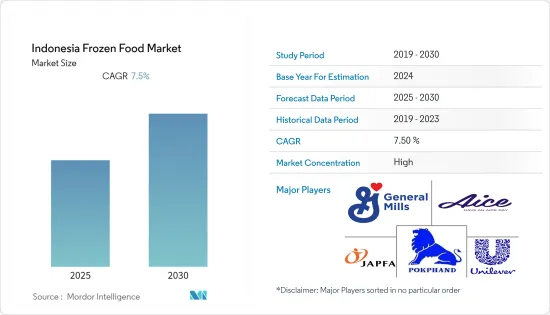PUBLISHER: Mordor Intelligence | PRODUCT CODE: 1687771

PUBLISHER: Mordor Intelligence | PRODUCT CODE: 1687771
Indonesia Frozen Food - Market Share Analysis, Industry Trends & Statistics, Growth Forecasts (2025 - 2030)
The Indonesia Frozen Food Market is expected to register a CAGR of 7.5% during the forecast period.

Indonesia is witnessing a surge in the number of nuclear families. According to Statistics Indonesia, 39.16% of households in Indonesia consisted of 2-3 family members as of 2022. These families are typically more liberal with spending and are driving the premiumization trends in the FMCG sector. Moreover, the increasing workforce participation and the busy lifestyle of individuals are changing the dietary patterns of consumers, which involve consuming quick and healthier meals. This, in turn, drives the retail sales of frozen food products that are convenient and easy to cook. In addition, the proliferation of value-added products in the country is a testament to consumers' need for practical and convenient products. For instance, according to the USDA Foreign Agricultural Service, in 2021, the retail sales value of packaged food in Indonesia amounted to 32,967 USD million. Besides this, international players in the frozen food segment are adopting innovative strategies such as expansion, merger and acquisition, and product launches to gain a prominent market share. For instance, in January 2022, Yili Group, a Chinese producer of dairy products, announced its expansion with the launch of its facility in Indonesia. The company claimed that the facility was established due to the popularity of Joyday Ice Cream in the country. This brand has rapidly expanded to 260 local cities in 26 provinces, covering nearly all of Indonesia, since its entry into the market in 2018.
Indonesia Frozen Food Market Trends
Increasing Demand for Convenience Food Products
The growing consumer demand for convenience meals is a critical factor bolstering the expansion of the Indonesian packaged food business. Since packaged foods require minimal or less preparation time, especially ready meals and frozen food, there has been an exponential rise in their popularity, especially among the working population. In addition to the time-saving factor, frozen food products can be a convenient and affordable way to incorporate nutrition into a regular diet. Since freezing helps preserve the nutrients of frozen food products, these products have more vitamins and minerals than fresh foods that lose their nutrients over time.
The rise in e-commerce further influences the demand for food products, including frozen food, via online retail stores. According to the International Trade Administration, the e-commerce sector exhibited a 23% increase in online transactions and nearly 63 million new users in 2021. The proliferation of the industry is supported by the rise in digital wallets such as GoPay, DANA, Ovo, and ShopeePay, along with a large, young, and tech-savvy population. Hence, such factors influence consumers' purchasing decisions for packaged frozen food via e-commerce channels across Indonesia.
Frozen Processed Meat Products are Currently in High Demand
Consumers in the country are more inclined toward frozen meat products, partly due to the hygiene issues associated with making fresh products available. According to UN Comtrade, in 2021, the imports of meat to Indonesia amounted to USD 965.34 million, compared to the imports in the previous year, valued at USD 710.54 million. The popularity of protein diets has further increased the consumption of meat and fish in the country. Moreover, with the increase in bilateral and international agreements regarding the expansion of agriculture and food trade, the frozen meat and fish segments are expected to grow during the forecast period. These products exhibit a longer shelf life, ranging from six months to a year, making them convenient for export to the farthest places. Indonesian companies export various types of fish meat after processing and adding preservative materials to meet international standards and consumer demand.
Indonesia Frozen Food Industry Overview
The Indonesian frozen food market is competitive, with numerous domestic and international players offering various frozen food products. The major players in the market, including General Mills Inc., Unilever PLC, and PT Charoen Pokphand Indonesia Group, are heavily capitalizing on research and development. Japfa Ltd and Aice Group Holdings are other leading players with a broad range of product offerings. Moreover, manufacturers are adopting a customer-centric approach to stay with ongoing trends about choosing products suitable for healthy lifestyle choices. They also offer products with international standards and certifications, such as organic and kosher.
Additional Benefits:
- The market estimate (ME) sheet in Excel format
- 3 months of analyst support
TABLE OF CONTENTS
1 INTRODUCTION
- 1.1 Study Assumptions and Market Definition
- 1.2 Scope of the Study
2 RESEARCH METHODOLOGY
3 EXECUTIVE SUMMARY
4 MARKET DYNAMICS
- 4.1 Market Drivers
- 4.1.1 Popularity of Convenient Food Products
- 4.1.2 Expansion of Cold Chain Logistics
- 4.2 Market Restraints
- 4.2.1 Concerns Over Food Safety and Quality
- 4.3 Porter's Five Forces Analysis
- 4.3.1 Threat of New Entrants
- 4.3.2 Bargaining Power of Buyers/Consumers
- 4.3.3 Bargaining Power of Suppliers
- 4.3.4 Threat of Substitute Products
- 4.3.5 Intensity of Competitive Rivalry
5 MARKET SEGMENTATION
- 5.1 By Type
- 5.1.1 Frozen Fruits and Vegetables
- 5.1.2 Frozen Ready Meals
- 5.1.3 Frozen Processed Meat Products
- 5.1.4 Frozen Processed SeaFood
- 5.1.5 Frozen Bakery Products
- 5.1.6 Other Types
- 5.2 By Distribution Channel
- 5.2.1 Hypermarkets/Supermarkets
- 5.2.2 Grocery Stores/ Convenience Stores
- 5.2.3 Online Retail Stores
6 COMPETITIVE LANDSCAPE
- 6.1 Most Adopted Strategies
- 6.2 Market Share Analysis
- 6.3 Company Profiles
- 6.3.1 General Mills Inc.
- 6.3.2 PT Charoen Pokphand Indonesia Group
- 6.3.3 Gunung Sewu Group (Belfoods Indonesia)
- 6.3.4 PT Sekar Bumi Tbk
- 6.3.5 Unilever PLC
- 6.3.6 JAPFA Ltd (PT So Good Food)
- 6.3.7 Ezaki Glico Co. Ltd (Glico)
- 6.3.8 Aice Group Holdings
- 6.3.9 Mccain Foods Ltd
- 6.3.10 Pronas Indonesia
7 MARKET OPPORTUNITIES AND FUTURE TRENDS




